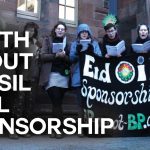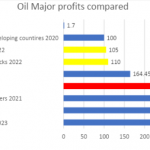Drenched in Oil – Ulster Bank, RBS and Ethics for the Belfast Festival
What links the suffering of the indigenous Cree Indians of Alberta, Canada, the international arms trade and the President of Belarus to a vibrant cultural event in Belfast, Northern Ireland?
The answer is Ulster Bank’s sponsorship of the Belfast Festival at Queen’s; or as it’s now called, the ‘Ulster Bank Belfast Festival at Queen’s.’ The 49th annual festival begins this week.
It came from humble origins; started by an undergraduate student in 1962, the festival blossomed and continued through the days of political upheaval to the present day. From Jimi Hendrix to the Moscow State Ballet, it can boast an impressive, star-studded history through very dark times to brighter days.
A few years ago, due to under-funding by both the University and the Department for Culture, Arts & Leisure, sponsorship was sought and met by Ulster Bank, in a 3-year deal starting in 2008.
Ulster Bank is part of the Royal Bank of Scotland (RBS) Group – a bank now 84% taxpayer-owned since it was bailed out by the UK government three years ago. The public now own the largest share of one of the biggest banks in the UK. The government is ultimately responsible for making sure that public money – that is to say, our money – is not being used in ways that would violate human rights or used to further unethical actions.
However, since 2008, RBS has awarded its failing executives, some of whom were credited with helping to create the financial crisis, with huge rewards from our money.
It has been identified as the world’s principal creditor to the arms industry, having participated in deals totalling an eye-watering £44.6 billion in the last 10 years, including deals involving producers of depleted uranium ammunition and cluster bombs.
It was recently forced to back down on a controversial loan it was prepared to make to the government of Belarus as its President, Alexander Lukashenko, cracked down on pro-democracy protestors.
And perhaps worst of all, RBS provides billions in loans to finance the extraction of the ‘tar sands’ of Alberta – a super-polluting form of oil extraction which involves using huge amounts of energy to remove the topsoil (and anything on it; trees, habitats, everything) to get at the oil underneath, destroying everything as this image shows. The First Nation communities in Alberta have documented serious impacts on their health – from very rare cancers to immune system-related illnesses, to a decline in local animal populations and water quality – not to mention over 17,000 violations of their indigenous rights guaranteed by centuries-old treaties.
As a report by a coalition of NGOs demonstrates, if the tar sands project can be proven to be viable in Alberta, this could see it rolled out to other parts of the world as oil addict economies become increasingly desperate and willing to do anything for a fix. If this type of oil extraction becomes acceptable, the world faces an even more grave challenge in dealing with the climate crisis.
Despite UK taxpayers now owning one of the biggest banks in the world, we continue to have little say in how it could create a better world for us and our children; or how it could easily become a force for good by financing clean technology.
And this is what links Ulster Bank and Queen’s University Belfast to the financiers of global suffering. The festival, it’s hard-working staff and its guests and performers are a force for good. The sponsor isn’t.
Is this really the kind of brand that a University that has just adopted the slogan ‘We Are Exceptional’ wants to be associated with? Exceptionally unethical? Exceptionally dirty?
Some may think that connection is absurd, but it’s very clearly a straight line. I’m so tired of people looking at investment in a vacuum. Part of the reason why unethical investment is permitted to exist is because people juxtapose the funding source and the end result. Sure, it’s near-impossible to live a 100% ethical live in a western consumerist democracy, but that’s no reason to do what many people do and just decide not to care about the ethics of anything. Some people are determined to ignore the cruel origins and decisions that furnish our lives with (often frivolous) first-world luxury. More active, more responsible, and more compassionate consumers could go a long way to changing this.
The EU have recently indicated they may clamp down on imports of tar sands oil. Now’s the time for RBS, other high street banks and their owners to put the long-term interests of taxpayers first and invest its considerable funds in low-carbon technology and disinvest in harmful industry. And now’s the time for Queen’s University to look into a different, less oil-drenched sponsor if RBS won’t do that.
In the meantime, what’s a decent response? Withdraw your money and put it into a bank that thinks before it invests your money in something unscrupulous. And tell your bank why you’re leaving. I did.




Can I inquire if you were fine with paid off blog posts?
All I’d want is for you to prepare posts on behalf of me and merely a website
link or reference to my page. Allow me to pay you.
Good article. This video stunt might be of interest: t.co/MLFLuWmH